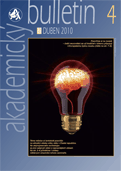
A Significant Contribution by a Czech Laboratory
The International Research Initiative for Wheat Improvement (IRIWI) held its first meeting on Thursday, 15 September 2011 in Paris at a meeting of the G20 group, associating the most advanced economies of the world. Distinguished scientists, directors of research organisations, food-industry experts and politicians gathered there. The initiative coordinates worldwide research leading to the improvement of better varieties of wheat. The aim is to increase their crop yields and avert a food crisis. Also Czech scientists from the Institute of Experimental Botany (ÚEB) of the Academy of Sciences of the CR and Centre of the Haná Region for Biotechnological and Agricultural Research cooperate within the IRIWI.
One of the current tasks is to decipher the complete genetic information, the so-called genome
of wheat. An international consortium of scientists cooperates in it, whose components include the
laboratory of Doc. Jaroslav Doležel from the Institute of Experimental Botany of the ASCR and
Centre of the Haná Region for Biotechnological and Agricultural Research. Docent (Associate
Professor) Doležel attending the initial session of the IRIWI in person, which demonstrates that
his work and the work of his colleagues is recognised also on the international scale.
Wheat research is supported here by the Ministry of Agriculture of the CR. ‘Every year, the
Ministry announces a competition for new research and development projects. In the last three
years, it has given roughly 28 million Czech crowns a year for research. For instance, we are
supporting 15 projects dealing precisely with the investigation of wheat this year alone. Support
of research and development is one of my clear priorities,’ stated Minister of Agriculture Ivan
Fuksa.
Wheat is one of the most important food crops. According to the data of FAOSTATS from 2009, it
has the greatest sown area worldwide (225 million hectares) and the second largest annual
production after maize (682 million tonnes). Despite this, there is beginning to be a shortage of
this corn in the long term: in six of the last ten years, its harvest was lower than the demand for
it. A large problem is thus created predominantly for developing countries – because wheat is the
main food for circa 1.2 billion poor people with an income of less than two dollars a day.
According to the estimate of the IRIWI, the demand for wheat will rise at least by 70% by
2050. The global harvest therefore should rise by at least 1.7 % annually. Except that today its
annual growth is a mere 1%. The solution should be brought by intensive research leading to new
varieties of wheat – with higher yields, more resistant to drought or pests and greater nutritional
values. The mission of IRIWI is for this research to be as effective as possible. The initiative
will therefore coordinate the individual scientific projects and facilitate the international
sharing of resources, experience and knowledge.
Unravelling the genome and other modern methods will accelerate improvement, which might bring
new high-quality varieties already in the next 15 years. The scientists plan that the ‘reading of
wheat’ could be finished in 2015, but it will be necessary to acquire a total of USD 50 million for
completion of the project. It is the great task for the IRIWI initiative. ‘I consider it as a great
success that it was possible to push through the assurance of enough food on the agenda of the G20
meeting. I hope that our laboratory aids in acquiring support for the research which is demanding
in terms of time and money. If we were funded on a level comparable with Western Europe, we could
contribute to the analysis of the genome of wheat in an even more significant way than today,’
emphasised Jaroslav Doležel.
Prepared by: Department of Media Communication (Head Office of the ASCR)
and the Department of Communications of the Ministry of Agriculture of the CR
20 Sep 2011



